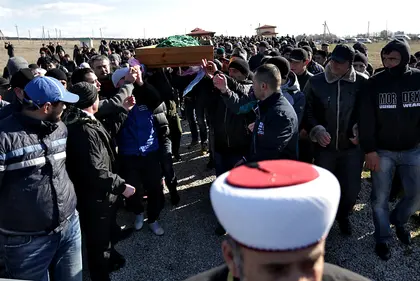And they fear he will not be the last.
Thousands of Crimean Tatars attended the
funeral today of Ametov, a human rights activist who disappeared on March 3 in Simferopol. His body, showing signs of torture, was found two weeks later.
JOIN US ON TELEGRAM
Follow our coverage of the war on the @Kyivpost_official.
After Ametov took part in a meeting to
support the EuroMaidan Revolution on March 3, a local TV crew
filmed him standing in silent protest before uniformed Russian-backed armed men
and Crimean self-defense forces surrounding the Cabinet of Ministers building
in Simferopol.
“He was just standing there and they
took him away,” Ametov’s mother, Refika Ametova, told the Kyiv Post. “He stood
there for about an hour and a quarter, and I suppose they were waiting for him
to leave. But he didn’t, and in the end they took his arms and took him away.”
Refat Chubarov, head of the Crimean
Tatar Mejlis, said that Ametov’s body was found on March 17 in the village of Zemlyanichnoye, with signs of torture.
Ayder Ismailov, a member of the Crimean human rights nongovernmental organization Arkadash, said “this wasn’t an ordinary death, it was a kind of genocide, an
inhuman crime, and we understand that we have to come together and consolidate
and be very wary, because I’m convinced this is only the beginning.”
An investigation is under way by members of the Crimean Tatar community into who murdered Ametov and for what reason — whether it was an isolated act of violence, spurred by racism or part of a plan to ignite broader conflict between the ethnic minority and Russian majority on the peninsula.

Since June, Ametov had been a member of
a working group which protected the rights of Crimean Tatars, especially in
areas where high concentrations live. These are generally built on areas
settled by the Crimean Tatars when they returned to Crimea in the early 1990s,
and often still lack basic amenities such as gas and water.
Nedim Halilov, another member of the
working group, said Ametov had been active until the birth of his youngest
child three months ago. After that the group encouraged him to spend more time
with his family, but Ametov continued to collect information and was outspoken
in his opposition to the Russian soldiers who appeared on Feb. 27.
“He wanted to do something about it, but
I told him not to,” Halilov said.
Ali Hamzin, head of communications at
the Crimean Tatar Mejlis, told the Kyiv Post that Ametov may have been murdered
because of his human rights work. “It
was simply the very cruel murder of our fellow countryman,” he said.
Hamzin also said that the Mejlis
consider his death to be linked with pro-Russian Crimean self-defense forces filmed
surrounding him in front of the Cabinet of Ministers building.
Enver Ablakimov, 21, who was at the
funeral today, said: “It
just shows that what is happening in Crimea now is completely illegal, if a
person can be killed just for expressing his opinion and because he was alone.”
Ablakimov also believes Ametov was
killed because he was a Crimean Tatar, the primarily Sunni Muslim community that makes up 12 percent of Crimea’s 2.2 million people.
He said anti-Crimean Tatar graffiti is
appearing around the peninsula.
“There were always people here who
didn’t like us, but before, they hid it,” he said. “Now with the appearance of
the Russian army, they feel protected and understand that no one will do
anything, so they’ve started to make trouble.”
Aliye Nabokova, who had come to the
funeral from Khoshkildir, remembered that the Crimean Tatars had suffered
similar incidents in the 1990s, when Crimean Tatars were beaten or killed. At
the time Mejlis leader Mustafa Jemilev persuaded Crimean Tatars not to react
violently to the attacks. Large-scale conflict did not erupt.
She said the difference between then and
now was “now we’re actually fighting with the government – the Crimean
government. We lived peacefully with Russians and Ukrainians, no one bothered
what language people spoke, we all spoke Russian… What’s happening now has all
been stirred up, and it’s bringing harm on them as well as us.”
The mood at the funeral today was subdued
grief. But Ismailov said that “inside we are awaiting a command. Who from?
Everyone knows that for himself. We’re in a situation verging on explosion that
could bring really unpredictable results. What is needed now is discipline,
understanding and determination not to rise to provocation.”
Thus far, the discipline and solidarity
which sustained the Crimean Tatars through a 30-year campaign of peaceful
protest to return to their peninsula homeland from exile under the Soviet
Union, appears to be holding.
“Of course I’m angry,” said Ablakimov.
“But that’s not enough reason to rise up and seek revenge.”
Kyiv Post staff writer Lily Hyde can be reached at [email protected].
Editor’s Note: This article has been produced with support from the project www.mymedia.org.ua, financially supported by the Ministry of Foreign Affairs of Denmark, and implemented by a joint venture between NIRAS and BBC Media Action.The content in this article may not necessarily reflect the views of the Danish government, NIRAS and BBC Action Media.
You can also highlight the text and press Ctrl + Enter




